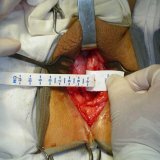Treatment of the sphincter of the urethra

Urinary incontinence is the process of involuntary urination that occurs as a result of improper hygiene and various colds. This disease is a problem all over the world and occurs quite often. Urinary incontinence can be sick both men and women equally. For a more complete understanding of this disease, it is worthwhile to dwell in more detail on how the urinary system of the human body is arranged.
Urine is formed in the kidneys after blood filtration takes place. On the ureters, urine passes into the bladder, where it accumulates up to a certain point. When enough urine accumulates to remove it, a signal enters the human brain, which carries the urge to remove unnecessary fluid. If the permissible norm of the volume of the fluid is exceeded, the bladder may involuntarily be emptied, in order to avoid rupture of the bladder. If urination occurs unexpectedly for a person, that is, a weak signal is sent to the brain, which a person is not able to sense, this means that a person needs to start treatment for the sphincter of the urethra.
Control of sphincters contracting the entrance to the urethra, carries out the cortex of the brain. A normal person can control the process of urination independently within reasonable limits. When urinating, the cerebral cortex sends signals to the bladder, in which the bladder itself contracts, and the sphincters unclench. But with some problems, the control of urination is lost by the brain and the bladder is emptied without "permission."
Character of the disease of the urethral sphincter.
Drug treatment of the urethra depends on the nature of the disease.
- Stressful.
- Mixed.
- Urgent or imperative.
- Involuntary urination due to overflow of the bladder.
- Functional.
Stress incontinence is determined by a violation of the mechanism that prevents the emptying of the bladder. Sometimes it can even be manifested during sneezing, fast climbing on the stairs, running and other active dynamic movements, at which the intra-abdominal pressure rises. This type of incontinence often occurs in patients who underwent surgery for the prostate, associated with cancer and prostatic hyperplasia. Also, the reason may be to weaken the pelvic muscles, which can lead to a sagging of the bladder. A sagging of the bladder can lead to pressure on the neck of the bladder, and the angle of the urethra. After this, the resulting pressure does not allow the inner sphincter to completely close, which can lead to a rupture of the sphincter.
Urgent or imperative incontinence always follows a strong urge, requiring immediate urination. Usually there is absolutely unexpected. This type of incontinence is often the main sign of hyperactive urethra.
Involuntary urination occurs when the bladder is not able to completely empty with a decreased activity of the bladder or with any obstruction to the flow of urine. The bladder does not empty until the end, therefore it increases in size, as a result of which the inner sphincter is stretched and urine flows outward. The cause of this can be spinal cord injuries or complications of certain diseases, such as multiple sclerosis or diabetes.
Functional incontinence is determined by the patient's mental illness, for example, with fear or unwillingness to go to the toilet, as well as in people with severe depression.
To groups of risk of occurrence of an urgent incontience of urine it is possible to carry the smokers sick of a diabetes and infections of urinary ways, older persons, people, obese, etc.
Mental condition of the patient and treatment of an involuntary micturition.
Consequences of urinary incontinence are not always fatal, but rather unpleasant. From medical consequences it can be noted that the chance of urinary tract infection, skin irritation of the perineum increases. But more attention should be paid to psychological consequences. The patient may be confused, awkward, feeling helpless. The embarrassment at dialogue with the doctor will put obstacles for correct statement of the diagnosis and purpose of treatment. To avoid wetting the laundry and spreading the characteristic smell, people try to stay as much time as possible at home, some become real hermits. Severe incontinence cases often require direct insertion into the urethra of a special tube through which the liquid flows into an external container. As a result, bacterial infection of the urinary system and urethral decubitus can occur.
Options for the treatment of the urethral sphincter set, a doctor can decide whether to determine the course of treatment, taking into account the particular course of the patient's illness.
Treatment of urethral canal disease can be achieved, either through drug therapy or by surgery. Of course, this depends on the neglect of the urinary and urinary system.
With an urgent or mixed form of incontinence, anticholinergic drugs, adrenoblockers, antidepressants and injections into the bladder that lower the sensitivity of the bladder to periodic nerve impulses are used. In conditions of stress incontinence, folk remedies can be used, and special surgical techniques and a spectrum of medications such as antidepressants, duloxetine, and adrenomimetics also provide good results.



